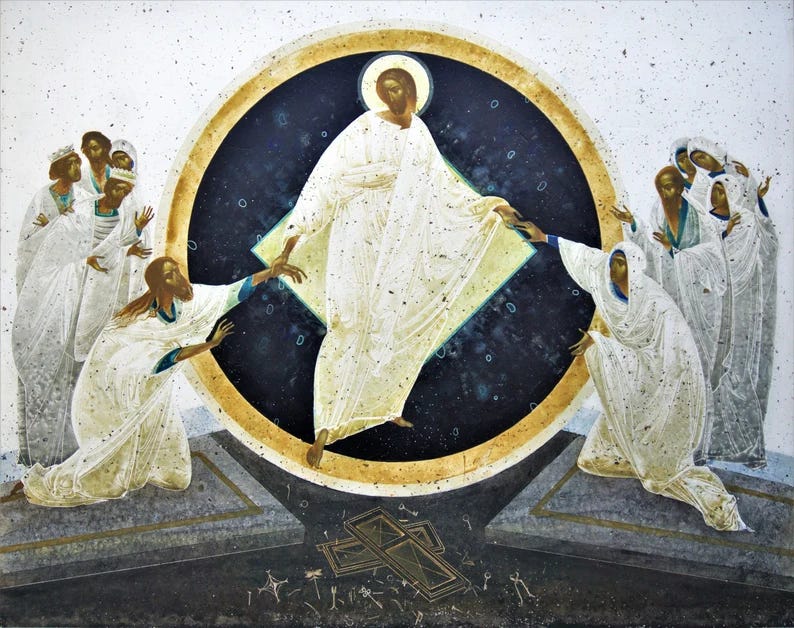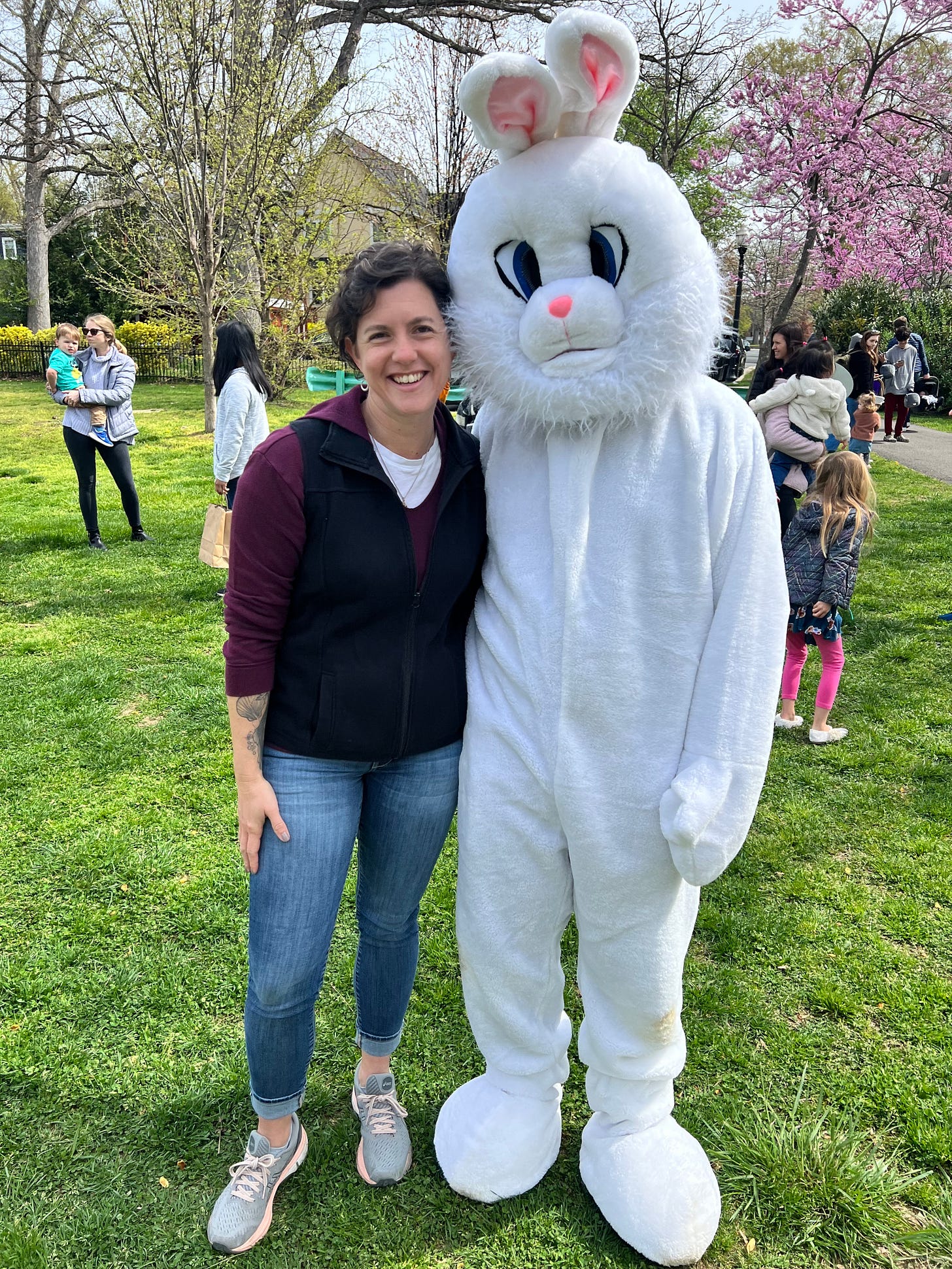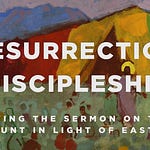
The stone was rolled away, the body gone, and we are unsure of what we are to do now.
The unexpected happened. Mary Magdalen and the other Mary went to the tomb expecting to anoint Jesus’ lifeless body, but when they arrived, an angel told them, “Do not be afraid; I know that you are looking for Jesus who was crucified. He is not here; for he has been raised, as he said. Come, see the place where he lay.”[1]
The dead man you are looking for is gone.
Don’t believe me? Come see where his body is not lying.
Rev. Fleming Rutledge reminds us no one goes to a cemetery expecting to find the dead raised.
So, today we find ourselves a week removed from the pomp and circumstance of God’s grand defeat of death, and if we are honest, it sort of feels like we do not know what we are supposed to be doing. Christmas comes with a week of Winter Break at the end of the calendar year so we can find our bearings and reorient ourselves to the discovery that God dwells among us. But Easter, for many of us, comes at the end of Spring Break. Many of you went back to work before all of the Easter decorations were carefully packed away.
After the lilies are gone, and the crumbs of communion bread are cleaned up, it is expected that we will return to life as it was before Mary and Mary’s grand announcement.
Everything is different now, yet everything feels the same, and this tension can leave us with a post-Easter celebration hangover.
Everything is different now, and as 1 Peter reminds us, by God’s great mercy, we have been given “a new birth into a living hope through the resurrection of Jesus Christ from the dead.”[2]
New birth into a living hope.
Over the coming weeks, we will explore how the resurrection of Jesus Christ gives us hope and how we can come to know this hope well enough to recognize it when we see it in our community so that we can celebrate with the same vigor as we did last Sunday.
This week, we begin with joy.
Eastertide, the fifty days after Easter, is a time for the Church to marvel at the miracle of the resurrection of Jesus. Before Easter, to seek the living among the dead would be a ridiculous suggestion. But when Mary and Mary went to the tomb, new life shined out of the darkness of the grave. The resurrection of Christ is God’s grand reversal.
What came before Easter Sunday – the violence and death of Good Friday and the fear and despair experienced by the disciples as they scattered and hid – is no more. And we, living as resurrection people, living with the knowledge that the trials and suffering we and others experience are no more because of the faithfulness of God.
The words written in 1 Peter were dispatched to a community under scrutiny. The recipients were Gentile Christians who would whisper a benediction after worship for fear of neighbors and even family, never dreaming of a wireless headset or Bose speakers.
They were fearful, afraid that they might be discovered as followers of a minority religion, a suspect faith.
The recipients of this letter were looked upon with suspicion as they moved about their community. They did not feel safe in their places of work or their homes.
In a world where they questioned going into hiding, contemplating taking their faith and Easter celebration underground, they were told to “rejoice,”[3] “rejoice with an indescribable and glorious joy.”[4]
Rejoice because, by the grand mercy of God, we have received “a new birth into a living hope.”[5]This is the Easter gift.
A promise sweeter than anything the Easter Bunny left in Pastor Sara’s Easter basket.

A gift grander than Dr. Bryan playing the organ or the guitar riffs Pastor Jeff practiced for weeks.
New life not based on our merits.
New life not earned through the trials we suffer or the good deeds we accomplish.
New life that is a gift through the power of Christ’s resurrection.
Our response to this gift is joy. Joy that extends beyond Easter Sunday because the Grace of God extends beyond the Table and church, permeating every nook and cranny of our lives.
Robert Farrar Capon wrote, “While we were yet sinners, Christ died for us. He has taken the cleanup entirely into his own hands. He has just gone and done it without waiting for us; and he invites us simply to trust that he has it all accomplished for us in Jesus—and to proclaim that trust by acting as if we really believed it.”[6]
Christian ethicist Stanley Hauerwas writes, “"The joy of Easter is not just personal, but social. It is a joy that we share with others."[7]
To act as though we believe in the resurrection of Christ, that we believe the creed we recited last Sunday, to live as resurrection people pulls the Church out of hiding and thrusts us into a state of joy that causes others to stop and wonder, “What’s in the water at that church?” What’s in the water at Mount Olivet?
What’s in the water?
Grace. Healing. Forgiveness. New life. Joy.
Joy of God’s Grace, healing, and forgiveness that moves us so worship is not confined to these four walls but extends to every corner of Arlington.
Joy that changes how we view one another, compelling us to acknowledge and honor the Imago Dei-ness that lives in each of us.
Joy that flips our attention away from the world's distractions so that we are laser-focused on the unwavering love of God.
The psalmist tells us the only thing to do with our joy is to rejoice. “My heart is glad, and my soul rejoices” because of the constant presence of God.
So, our Easter celebration continues – with word, song, and sacrament; with joy.
The joy of the Lord is here, giving us new birth into a living hope.
[1] Matthew 28:5-6, NRSV
[2] 1 Peter 1:3
[3] 1 Peter 1:6
[4] 1 Peter 1:8
[5] 1 Peter 1:3
[6] Capon, Robert Farrar. Light Theology and Heavy Cream: The Culinary Adventures of Pietro and Madeline. Cowley Publications.2004.
[7] Hauerwas, Stanley. A Community of Character: Toward a Constructive Christian Social Ethic. 1981.



















Share this post